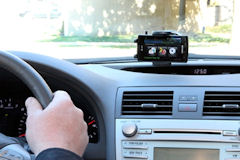 Sooner or later the United States will embrace Mileage Based User Fees (MFUBs) as a financing tool for roads and highways. The idea makes so much sense that even American politicians can understand it. Every vehicle owner should pay taxes for road maintenance in direct proportion to which he contributes to the need for that maintenance. Hitting up motorists for their share of the cost of maintaining the system dampens over-use and congestion. (Deciding who pays for new construction is trickier, and I defer that issue for now.)
Sooner or later the United States will embrace Mileage Based User Fees (MFUBs) as a financing tool for roads and highways. The idea makes so much sense that even American politicians can understand it. Every vehicle owner should pay taxes for road maintenance in direct proportion to which he contributes to the need for that maintenance. Hitting up motorists for their share of the cost of maintaining the system dampens over-use and congestion. (Deciding who pays for new construction is trickier, and I defer that issue for now.)
The big stumbling block is privacy. Equipping a car with a GPS box and tracking its every movement is not a power that everyone is willing to bequeath to government. Fortunately, the Oregon Department of Transportation, which first began testing MFUBs in 2007, has learned a lot from its experience. Writing in the Jefferson Policy Journal, Bob Poole with the Reason Foundation explains how the thinking has evolved:
Oregon DOT … is kicking off a new pilot test this fall, based on a new vision. First, the system needs to be simple and offer motorists a choice of methods. Second, the system must be cost-effective, auditable, and protective of personal information. Third, it should build on what already exists in the marketplace. And fourth, the state’s role should be limited to things like setting standards, certifying approved private-sector applications, and deciding the level and structure of charges. …
There will be four basic alternatives in the new pilot test. The basic onboard unit will be a “dongle” that plugs into the vehicle’s diagnostic port and records only total miles driven. A second alternative will make use of existing systems such as Onstar that owners already have in their vehicles, which can report locations as well as miles. A third alternative will couple the dongle with a Bluetooth connection to a smart phone or tablet; this will enable users to distinguish between miles driven in-state (which will be charged for) and those driven out-of-state. The fourth category is aftermarket devices such as navigation units that can also report miles by location, if people choose to use them for that purpose.
And for those not wanting any MBUF technology in their vehicle, ODOT is planning a system by which people can buy miles in, say, 5,000 or 10,000-mile increments. “Over time, people will gravitate toward the easiest method [for them].”
Is there any chance of experimenting with MFUBs in Virginia? I’ve heard not a peep from the McDonnell administration.
— JAB


